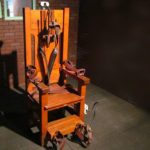WASHINGTON (ABP) — Fewer death sentences were imposed in 2009 than in any year since the Supreme Court reinstated capital punishment in 1976, according to year-end statistics compiled by the Death Penalty Information Center.
It marked the seventh consecutive annual decline — with the rationale for juries, judges and prosecutors increasingly shifting away from the morality of the death penalty toward whether the higher cost of executing criminals is worth the benefit it brings to society.
The American Law Institute — the organization that laid legal groundwork for the death penalty in the early 1960s — voted in October to abandon support for it in October. The institute — which represents about 4,000 judges, lawyers and law professors — overwhelmingly adopted a resolution stating that America's half-century experiment with the death penalty has failed to develop even "a minimally adequate system for administering capital punishment."
Eleven states considered repealing the death penalty in 2009, with high cost and lack of measurable benefit during severe budget crises frequently mentioned as a theme of legislative debate.
The Supreme Court has ruled that there must be a heightened level of due process in cases involving the death penalty. That makes them more expensive to prosecute than non-capital cases. There are no national figures on the cost of the death penalty, but every state that has studied it has concluded the death-penalty system is far more expensive than alternatives like life without parole.
In testimony before a panel reviewing the death penalty in New Hampshire, Richard Dieter of the Death Penalty Information Center, a group that opposes capital punishment, said those costs multiply because of how the system really works. A single death penalty trial might cost a state $1 million more than a non-death-penalty trial, he said, but only one in three capital trials may result in a death sentence. That makes the true cost of a death-penalty conviction is more like $3 million. In some states, like Maryland, only one in 10 death sentences ever results in an execution. That would mean the real cost to put a single inmate to death was $30 million.
In a nationwide poll of 500 police chiefs by the Death Penalty Information Center, officers ranked the death penalty the least-efficient use of taxpayer money to reduce violent crime.
Another factor shaking public support for the death penalty is development of DNA evidence, which has resulted in overturning about 250 wrongful convictions since 1989, including 17 involving inmates on death row.
In March, New Mexico became the 15th state to abolish the death penalty. Gov. Bill Richardson (D), a life-long supporter of capital punishment, signed the bill. He said new DNA evidence exonerating individuals on death row caused him to reconsider his earlier views.
Sign up for our weekly edition and get all our headlines in your inbox on Thursdays
"Faced with the reality that our system for imposing the death penalty can never be perfect, my conscience compels me to replace the death penalty with a solution that keeps society safe," Richardson said in a statement. "In a society which values individual life and liberty above all else, where justice and not vengeance is the singular guiding principle of our system of criminal law, the potential for wrongful conviction and, God forbid, execution of an innocent person stands as anathema to our very sensibilities as human beings."
Other arguments against the death penalty claim it is imposed unfairly. Deacons at First Baptist Church in Jefferson City, Mo., joined more than 300 other faith groups, businesses and organizations calling for a moratorium on executions while the state's death penalty is studied.
"The death penalty as now administered appears to be exercised often in unfair ways, with the burden of death falling on African Americans disproportionately, with crimes against males punished by death more than crimes against females and the rich executed far less [often] than the poor," John Baker, pastor of First Baptist Church in Columbia, Mo., said at a press conference held at the church Jan. 6.
In August the federal Supreme Court ordered a hearing to receive testimony about whether new evidence establishes the innocence of Troy Davis, an African-American man on death row for the 1991 murder of a white police officer in Savannah, Ga.
Seven of nine witnesses who testified they saw Davis shoot and kill Officer Mark Allen McPhail later recanted, saying police pressured them into falsely fingering Davis. One of two witnesses who did not recant allegedly told family and friends that he is the actual murderer.
Supporters of the fallen officer say Davis was convicted on physical evidence and should be executed in the name of justice. But Alan Bean, an ordained American Baptist minister who runs a criminal-justice-reform organization called Friends for Justice, said manipulation of eyewitness testimony is a problem in the court system nationwide.
"Not only do police officers and investigators coerce 'eyewitnesses' into cooperating with the government's theory of the case," said Bean, a white man who helped bring national attention to a noose-hanging incident that revealed racial tensions in Jena, La. "There is growing evidence that even sincere and well-intentioned eyewitness testimony if far less reliable than is generally believed."
Bean started Friends of Justice in response to a famous drug sting in Tulia, Texas, in 1999, in which more than half of the town's black male residents were arrested and convicted on the questionable testimony of a single undercover officer. Bean said he is monitoring the Troy Davis case because of its similarity to one involving Curtis Flowers, a black man behind bars for a 1996 execution-style slaying of four people in Winona, Miss., who has been tried five times without a final conviction by the state.
More executions were carried out in 2009 than in 2008 — 52 compared to 37 — but the Death Penalty Information Center said that was partly due to backlog from a de facto moratorium on executions for four months of 2008, as the Supreme Court addressed controversy over the use of lethal injection. Texas led all states with 24 executions — four times the number executed in No. 2 Alabama. California has the largest number of inmates on death row — 690 — in part because executions are on hold because of challenges to the three-drug protocol used in the state's capital-punishment method.
-30-
Bob Allen is senior writer for Associated Baptist Press.














We seek to connect God’s story and God’s people around the world. To learn more about God’s story, click here.
Send comments and feedback to Eric Black, our editor. For comments to be published, please specify “letter to the editor.” Maximum length for publication is 300 words.